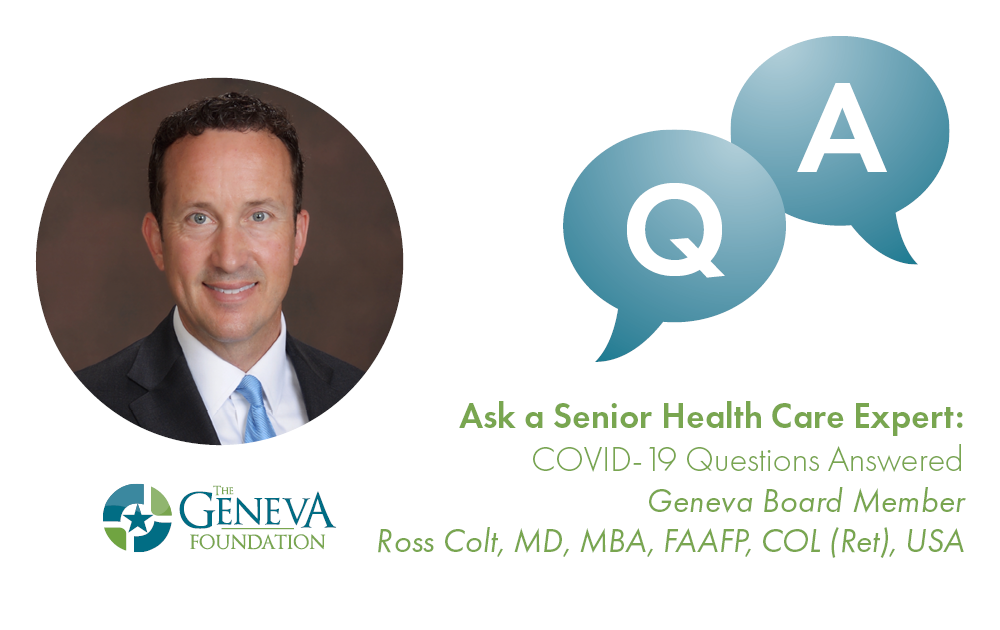19 October 2021
Ask a Senior Healthcare Expert: COVID-19 and Senior Care Questions Answered
No segment of the population has been hit harder by COVID-19 than seniors, both in our communities and in senior care facilities. COVID-19 vaccine booster shots are now available for Pfizer-BioNTech vaccine recipients who meet certain criteria and understandably, people still have a lot of questions. It can be difficult to keep up with all of the information – and misinformation – available, so we talked to Geneva Board of Directors Member Ross Colt, MD, MBA, FAAP, COL (Ret.), USA to help set the record straight on COVID-19 and senior care.
Army Colonel (Ret.) Ross Colt, MD, MBA, FAAFP has served as the Medical Director for Gary and Mary West PACE, providing comprehensive medical and support services to seniors with chronic care needs since 2018. He is a family physician with more than two decades of full-spectrum clinical practice experience, including a deep background in academic medicine and leadership in managed care environments at the regional and national levels. As a Board Member, Dr. Colt ensures that Geneva achieves its mission to support the advancement of military medicine and equally creates a vision to attain greater potential in the years to come.
Question: Is it safe to have my loved ones in a nursing home in light of widespread COVID-19 outbreaks?
Answer: The decision to place a family member in a nursing home is never taken lightly. This is a highly individualized decision with many components and many complexities. Each individual’s medical condition, family support available, and services offered by the facility should all be considered. While the COVID-19 pandemic resulted in devastating outcomes in many skilled nursing facilities, seniors living in the community have also been greatly afflicted. A skilled nursing facility that is following the regulatory and public health guidelines for COVID-19 can continue to provide excellent care for a loved one that cannot be safely managed at home.
Question: How can I protect my loved ones from COVID-19 who are receiving nursing care?
Answer: The best protective measures from COVID-19 are also the simplest: proper handwashing, use of masks, and appropriate social distancing. All caregivers providing nursing care to patients should be using gloves and washing hands in between each patient. Masks should be worn at all times by caregivers in a health care facility and should be strongly considered in the home. Finally, evolving guidelines from public health authorities currently recommend that health care workers and home care providers should be vaccinated to protect both themselves and their patients from COVID-19.
Question: How important is it for elderly populations to receive a booster or third dose? What is the difference between a booster and a third dose?
Answer: While new scientific data is being made available on a rolling basis, our current understanding is that the protective immunity provided by the COVID-19 immunizations wanes over time. The risk of severe illness from COVID-19 leading to hospitalization or death increases with age. Current CDC guidelines recommend that people aged 65 years and older and adults 50–64 years with underlying medical conditions should get a booster shot of Pfizer-BioNTech vaccine.
A booster shot is for people who had an adequate initial immune response to the vaccine, but whose immune response may have weakened over time. An additional dose is for people who may not have developed a strong enough immune response from the first two doses, such as in people who are immunosuppressed.
Question: Do the benefits of a booster or third dose outweigh the risk, particularly in these more fragile populations?
Answer: Based upon the recommendations of the CDC and other public health authorities, the benefits of receiving a booster or third dose outweigh the risk in these more fragile populations.



